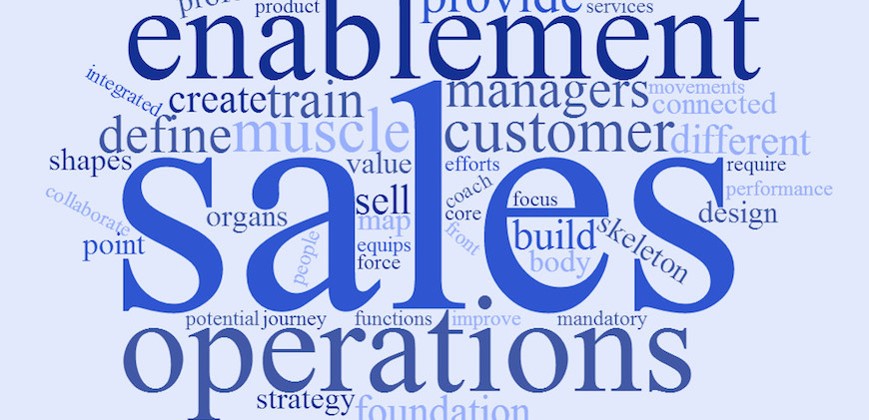Mike Kunkle is leading an important discussion about a new trend in Sales Enablement. Mike identifies the issue:
“I’ve been reading Sales Enablement leadership job descriptions lately. I find it concerning how many paint the enabler as responsible for working directly with reps to improve their performance. Not as an occasional field support effort, or a reality check on what’s happening out there, but as a main tenet of the role. And the front line managers are doing what, exactly”
Like Mike, I’m seeing the same trend. Increasingly, sales enablement organizations are being staffed up and given the responsibility to coach and develop front line sales people, helping maximize their performance.
But isn’t that what front line sales managers are supposed to do? Isn’t the job of the front line sales manager to maximize the performance of each person on their team? To develop and grow those people? Doesn’t the data show the highest leverage use of the front line sales manager’s time is spent in coaching and developing their people?
Reading the comments in Mike’s discussion gives clues to the problem, but also raises the issue, is sales enablement addressing the right problem by putting resources in place to coach sales people, rather than holding the front line sales manager accountable for doing their jobs?
Many say, managers don’t have the time, they don’t have the skills, they haven’t been trained to coach and drive performance of their people. Some say they’re spending all their time managing the numbers, hiring, doing pipeline analyses, or in strategy and other important internal meetings.
These are real issues, too many front line managers are not coaching and developing their people—or they do terrible jobs at this. As a result, many organizations have sales enablement professionals jumping into the void. They are investing in sales enablement resources to fill this gap, performing the single most important responsibility of sale managers: maximizing the performance of each person on their teams.
This raises huge numbers of issues? Who is accountable for the performance of the people on the sales manager’s team? Sales enablement or the sales manager? Who is responsible for setting performance expectations with each person, reviewing their performance, addressing poor performance?
Who are the sales people accountable for their performance? Sales enablement or their managers?
As a sales person, who am I to look to for support and development? Who am I to look to for help in winning deals, developing my pipeline and managing my territory?
As a sales executive, I start to look at issues like “Cost of Selling.” Why invest in two people doing the same thing? Aren’t I adding complexity and confusion, rather than addressing the core issues of manager and sales performance?
As the discussion of deploying sales enablement professionals into coaching roles percolates in sales enablement circles, there is the complementary discussion that seems completely absent from those discussions, Sales Manager Enablement!
It seems the focus of sales enablement is on enabling sales people, forgetting there are others in the organization that must be enabled.. Their biggest leverage point in driving organizational performance is actually through front line sales managers.
When I challenge sales enablement professionals about this issue, often the response is, “Well manager involvement underlies everything we do….” or “Manager involvement is implicit in every great sales enablement program.”
But if it really were, how do we explain this trend to displace Front Line Sales Management coaching with people from sales enablement?
If sales managers were at the core of sales enablement strategies, why would people be saying, “Sales managers don’t have the skills, ability, training, time, …. to do these things?”
Sales Management Enablement cannot “underlie” or “be implicit” in sales enablement priorities. It has to be explicit, it has to be front and center for everything sales enablement does. It’s the front line sales manager, working day to day with their people, who really understand the challenges to individual performance. It’s the front line sales manager’s job to address these issues, maximizing the performance of each individual in their organization.
Sales enablement exists to serve the front line sales managers in supporting their efforts, not to displace them.
Rather than providing the wrong solution to the issues of coaching and improving performance of individuals, why doesn’t sales enablement focus on the right solution of Sales Manager Enablement?

David, great post on sales coaching. As a reinforcement of your message I just read an excellent book called The Toyota Way. Toyota emphasizes managers teaching skills as critical to Toyotas success in the marketplace. You are in good company.
Thanks Doug, the Toyota Way is fundamental to so many great business practices.
One thing to remember about sales enablement is that it is an ongoing process. Not only that, but sales enablement is meant to empower and serve the front-line sales managers, not lessen their importance. The goal is to provide the sales team with the right coaching and training.
Without a doubt, Caroline. It is an ongoing process and the FLSM is at the core of that process. My primary concern with many sales enablement initiatives is they tend to bypass the FLSM or ignore FLSM development totally. Without these, sales enablement efforts ultimately don’t achieve what they could.